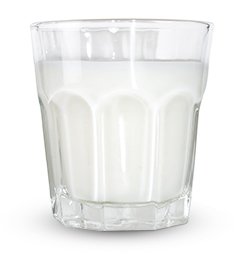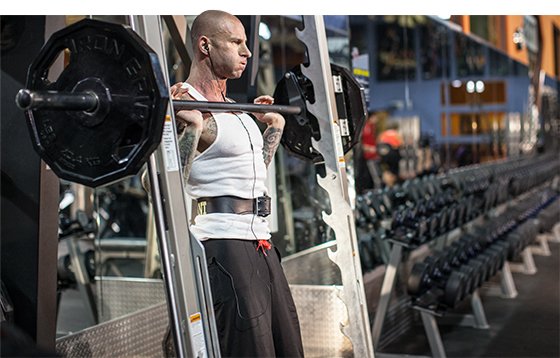I DIDN'T PLAN AHEAD, MAN. NOW I'M HEADING DOWN THE HIGHWAY WITH NO WHEY IN SIGHT, TRYING TO FIGURE OUT HOW I'M GOING TO MEET MY MACROS. HAVE ANY SUGGESTIONS FOR A QUICK PROTEIN SOURCE?
When I'm out on the road and need a convenient, low-carb protein source, I often pull into a gas station or convenience store and grab an RTD (ready-to-drink) like Muscle Milk. But the last time I posted a photo to Facebook of the Muscle Milk that I grabbed while on the go in Florida, I was surprised at how many negative comments it generated.
The reason was that if you look at the ingredients list, you'll notice that whey protein is way down on the list. The main protein source at the top of the ingredient list (meaning the product has the highest amount of it) is milk protein, in the form of milk protein isolate and milk protein concentrate.
So is milk protein isolate or concentrate a low-quality protein source? No! It's actually a high-quality protein source. Here's why you shouldn't overlook it.
WHAT'S MILK PROTEIN MADE OF?
Milk protein is made of whey protein and casein protein. More specifically, it is about 20 percent whey and 80 percent casein. It is manufactured by removing a good portion of the carbohydrates and fat from milk through gentle filtration processes.
This leaves the milk protein in its natural state, as it would be found in milk. It contains the same beneficial peptides and microfractions, such as beta-lactoglobulin, alpha-lactalbumin, bovine serum albumin peptides, immunoglobulins, lactoferrin, and lactoperoxidase, all of which provide performance- and physique-enhancing benefits, as well as antioxidant and immune-boosting properties.
WHAT'S MILK PROTEIN
MADE OF?
MADE OF?
20%
WHEY
WHEY
80%
CASEIN
CASEIN
The casein in milk protein is also maintained in its original state, known as micellar casein. This form of casein digests the slowest, providing a prolonged delivery of amino acids to muscle fibers.
WHEY AND THEN SOME
From my perspective, the only reason people think that milk protein is a lower-quality protein is because they believe that whey is the only high-quality protein, and all other protein powders are seriously inadequate compared to it. This is far from the truth.
Now, there is no debating the fact that whey is a superior protein. You definitely want to make sure that you get some whey any time you consume a protein powder, but especially around workouts. This is due to whey's high content of BCAAs and because of its rapid digestion rate. Plus, it also contains the specific peptides and microfractions I discussed earlier.

However, it's also important to remember that milk protein is whey protein. Well, 20 percent of it is, anyway. Of course, the rest of it is micellar casein. But that doesn't decrease the quality of milk protein—it actually increases it.
As I've written many times, research shows that adding casein protein to whey enhances the anabolic effect of the protein. Whey protein is important for quickly spiking muscle protein synthesis, but when casein protein is included with whey, it maintains that higher protein synthesis for considerably longer than whey by itself. Casein also puts the breaks on muscle protein breakdown. And since muscle growth occurs when muscle protein synthesis is greater than muscle protein breakdown, this all adds up to greater muscle growth.
MILK DELIVERS!
Don't take this the wrong way, but if I was given a choice of just whey or milk protein isolate, I would choose the milk protein. This is because you get a high-quality protein blend of both whey and casein in their most natural states.

"DON'T TAKE THIS THE WRONG WAY, BUT IF I WAS GIVEN A CHOICE OF JUST WHEY OR MILK PROTEIN ISOLATE, I WOULD CHOOSE THE MILK PROTEIN."
Ideally, I would prefer a little bit more whey and possibly a protein source that digests somewhere in between whey and casein, such as soy or egg protein, to bridge the gap between the fast-digesting whey and the slow-digesting micellar casein. But really, milk protein does the job well.
So the next time you see milk protein isolate or milk protein caseinate listed on a protein powder, RTD, or protein bar, don't snub it. Milk protein is one of the highest quality forms of protein you can consume. Now you know why.
References
- Soop, M., et al. Coingestion of whey protein and casein in a mixed meal: demonstration of a more sustained anabolic effect of casein. Am J Physiol Endocrinol Metab. 2012 Jul 1;303(1):E152-62.
- Kerksick, CM, et al. The effect of protein and amino acid supplementation in performance and training adaptations during ten weeks of resistance training. Journal of Strength and Conditioning Research 20(3), 643-653, 2006.
- Tipton KD, Ingestion of casein and whey proteins result in muscle anabolism after resistance exercise. Med Sci Sports Exerc. 2004 Dec;36(12):2073-81.
- Paul, G. L., et al. The rationale for consuming protein blends in sports nutrition. Journal of the American College of Nutrition 28 (4):464S-472S, 2009.
- Reidy, P. T., et al. Protein Blend Ingestion Following Resistance Exercise Promotes Human Muscle Protein Synthesis. J Nutr., in press, 2013.



No comments:
Post a Comment